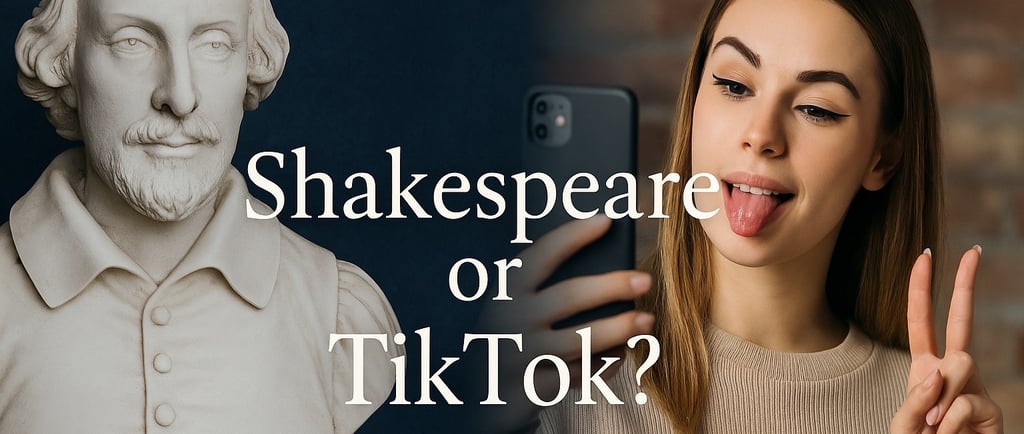Shakespeare or TikTok? The Surprising Origins of Popular Phrases
Language is constantly evolving, shaped by each generation's creativity and communication styles. While William Shakespeare coined over 1,700 words and countless phrases that we still use today, TikTok has similarly become a modern linguistic laboratory where new expressions emerge and spread globally within days. But can you tell which popular phrases originated from the Bard's quill and which were born in the digital age? Let's test your knowledge with our "Shakespeare or TikTok?" challenge!
Rosalind Fairfax
5/18/20255 min read


The Language Quiz: Shakespeare or TikTok?
For each phrase below, guess whether it originated with Shakespeare or on TikTok before reading the explanation. Some answers might surprise you!
1. "Living rent-free in my head"
Origin: TikTok ✓
This phrase describing thoughts or people you can't stop thinking about became ubiquitous on TikTok around 2020. While Shakespeare certainly understood obsession (just ask Hamlet), this particular expression is purely modern, reflecting our contemporary understanding of mental bandwidth as valuable real estate.
Modern Usage: "That embarrassing thing I said in the meeting is living rent-free in my head all weekend."
2. "Green-eyed monster"
Origin: Shakespeare ✓
From Othello, this vivid description of jealousy has endured for centuries. Iago warns Othello: "O, beware, my lord, of jealousy; It is the green-eyed monster which doth mock the meat it feeds on." The phrase perfectly captures how jealousy consumes us while making us miserable.
Modern Usage: Still commonly used today, though you might find it hashtagged as #greeneyedmonster in posts about relationship insecurities.
3. "Main character energy"
Origin: TikTok ✓
This phrase emerged around 2020, describing someone who acts as if they're the protagonist in their own movie—confident, self-focused, and unbothered by others' opinions. Though Shakespeare created many memorable main characters, he never explicitly conceptualized this phenomenon.
Modern Usage: "She walked into the party with total main character energy, and everyone noticed."
4. "In my villain era"
Origin: TikTok ✓
A popular TikTok phrase from 2021-2022 indicating someone is embracing their selfish side, prioritizing themselves, or acting without concern for others' approval. While Shakespeare created iconic villains like Iago, Richard III, and Lady Macbeth, this meta-awareness of entering a personal "villain phase" is distinctly modern.
Modern Usage: "Not answering work emails on vacation. Sorry not sorry. I'm in my villain era."
5. "Wild goose chase"
Origin: Shakespeare ✓
This phrase first appeared in Romeo and Juliet when Mercutio says: "Nay, if thy wits run the wild-goose chase, I have done." Shakespeare was referring to a horse race where riders followed a lead rider unpredictably, like geese following their leader. Today it means any foolish or hopeless pursuit.
Modern Usage: Still commonly used, though few realize they're quoting Shakespeare when complaining about wasted efforts.
6. "Love is blind"
Origin: Shakespeare ✓
While this may sound like the name of a modern reality dating show, the phrase comes from The Merchant of Venice: "But love is blind, and lovers cannot see the pretty follies that themselves commit." Shakespeare understood how romance clouds judgment long before dating apps existed.
Modern Usage: This phrase remains popular both in its original form and as the title of a Netflix reality show, showing how Shakespeare's insights into human nature endure.
7. "Caught in 4K"
Origin: TikTok ✓
This slang term means being caught doing something embarrassing or inappropriate on high-definition video (4K resolution). The phrase gained popularity on TikTok around 2020-2021 as recording devices became more ubiquitous and higher quality.
Modern Usage: "He said he was working late but got caught in 4K at the basketball game on the jumbotron."
8. "Break the ice"
Origin: Shakespeare ✓
From The Taming of the Shrew: "If it be so, sir, that you are the man must stead us all, and me amongst the rest, and if you break the ice and do this feat..." Shakespeare used it metaphorically for beginning a difficult enterprise; today we use it for starting conversations.
Modern Usage: Still extremely common in social and professional contexts, often as "icebreaker" activities.
9. "It's giving..."
Origin: TikTok ✓
This phrase means something is emanating a particular vibe or aesthetic. It originated in LGBTQ+ and Black communities before gaining mainstream popularity on TikTok around 2020-2021, where users would assess fashion, decor, or attitudes with "It's giving [descriptor]."
Modern Usage: "That outfit with the shoulder pads and bright colors? It's giving 1980s corporate power suit."
10. "All that glitters is not gold"
Origin: Shakespeare ✓
From The Merchant of Venice, though Shakespeare actually wrote "All that glisters is not gold." The modernized "glitters" version remains one of his most quoted warnings about deceptive appearances.
Modern Usage: The phrase has inspired everything from song lyrics to cautionary Instagram captions about misleading social media perfection.
11. "Sneaky link"
Origin: TikTok ✓
This term for a secret romantic or sexual rendezvous gained popularity on TikTok in 2021. While Shakespeare wrote plenty about clandestine meetings between lovers (Romeo and Juliet anyone?), this particular phraseology is purely 21st century.
Modern Usage: "She told her roommates she was studying, but she was actually meeting her sneaky link."
12. "Too much of a good thing"
Origin: Shakespeare ✓
From As You Like It: "Why then, can one desire too much of a good thing?" This rhetorical question evolved into one of Shakespeare's most practical and enduring phrases about moderation.
Modern Usage: Still commonly used when discussing everything from desserts to screen time, showing Shakespeare's practical wisdom transcends centuries.
13. "Period" (as emphasis)
Origin: Modern, popularized on TikTok ✓
Using "period" (or "periodt") as emphatic punctuation to a statement originated in Black vernacular English and gained mainstream popularity through social media, especially TikTok. It functions as a verbal full stop emphasizing that no further discussion is needed.
Modern Usage: "This is the best pizza in the city, period."
14. "Wear one's heart on one's sleeve"
Origin: Shakespeare ✓
From Othello, when Iago falsely claims: "But I will wear my heart upon my sleeve for daws to peck at: I am not what I am." The phrase describes showing emotions openly, making oneself vulnerable—something Iago pretends to do while being the opposite.
Modern Usage: Still describes emotional openness, though few realize they're quoting the duplicitous Iago when using it positively.
The Linguistic Bridge Across Centuries
What's fascinating about this comparison is not just identifying origins, but recognizing patterns in language evolution:
Similarities Between Shakespeare and TikTok Language:
Efficiency in Expression: Both Shakespeare and TikTok creators compress complex emotions or situations into memorable phrases. Shakespeare had sonnet constraints; TikTok has video time limits.
Metaphorical Thinking: From Shakespeare's "green-eyed monster" to TikTok's "main character energy," both rely on vivid metaphors to express abstract concepts.
Cultural Resonance: Phrases that endure, whether from the 1590s or 2020s, capture universal experiences in ways that feel fresh and insightful.
Linguistic Playfulness: Both Shakespeare and TikTok creators invent words, repurpose grammar, and break linguistic rules creatively.
Why Some Phrases Endure:
Shakespeare's staying power comes from his deep understanding of human nature combined with linguistic innovation. Similarly, TikTok phrases that gain lasting traction typically capture contemporary experiences in uniquely satisfying ways.
What remains to be seen is which TikTok expressions will still be used four centuries from now. Will future generations quote "main character energy" as readily as we reference "breaking the ice"?
The Verdict
Language doesn't belong to any one era—it's a living, evolving entity shaped by each generation's needs and creativity. Shakespeare wasn't writing for literary immortality but for audiences who wanted entertainment and insight. Similarly, TikTok creators aren't trying to coin phrases for the ages but to express contemporary experiences authentically.
The phrases that endure—whether from Elizabethan theaters or smartphone screens—do so because they perfectly capture something essential about being human in a way that continues to resonate across time.
How did you score on our quiz? Were you surprised by any of these origins? Share your favorite Shakespeare phrase or TikTok expression in the comments below!
